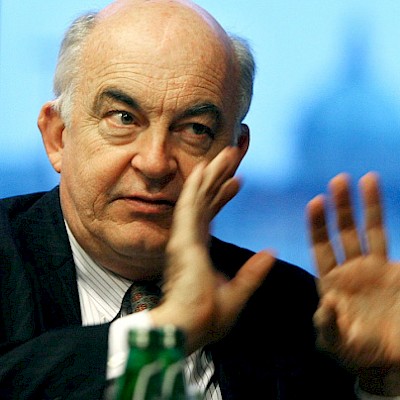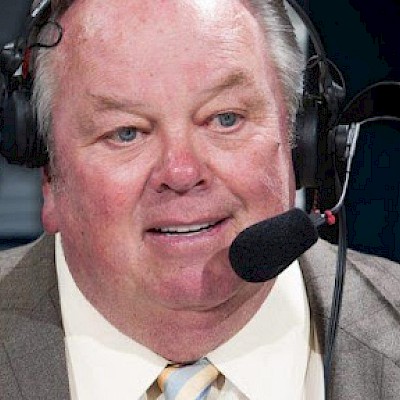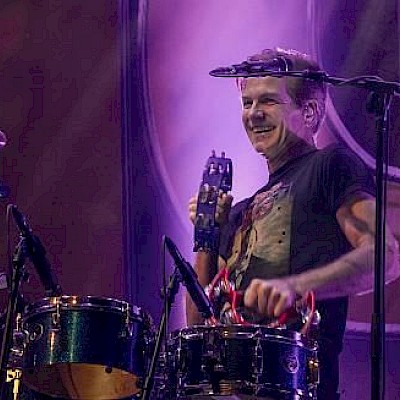Pat Torpey, drummer of Mr Big has passed away at the age of 64. He had been suffering from Parkinson’s disease.
I live on a different continent, so sadly I won’t be there. From 2009-11, I was the bass technician on tour for Mr Big. Pat was my friend in that time and I’ll miss him. This is hard to write but I’d really like to do him tribute.
Pat was born in Cleveland, Ohio but moved to Phoenix, Arizona as a teenager. A love of his music and the lure of the bright lights brought him to LA in the early 1980s, where he picked up session, TV and touring work for a million artists including Ted Nugent, John Parr, Bob Geldorf, Belinda Carlisle, Robert Plant, Chris Impelliteri and even former WHAM! star Andrew Ridgley.
It was while playing with The Knack, of ‘My Sharona’ fame, that Billy Sheehan and Paul Gilbert first saw Pat in action and asked him to audition for the new band they were forming together with vocalist Eric Martin. This of course, became Mr Big.
Pat’s role in Mr Big was often overlooked. While Billy and Paul stole the limelight with their fretboard antics and Eric Martin stole the little girls’ hearts, Pat was doing the hard work in the background.
I truly believe that in many ways Pat saved Mr Big. You see, Pat had all his drum chops down, double kick techniques, stick spinning etc etc but he also had this amazing groove…
All drummers who can basically play in time have some kind of groove. Some have it different or better than others. Essentially, a good groove makes the listener tap their foot along at first listen. Pat had a truly awesome groove.
Quite often this separates a good band from an outstanding band. Mr Big would have been a good band without Pat’s groove, a very good band actually, but with him they were truly outstanding.
Try listening to this and unconsciously you’ll find yourself tapping your foot along. That’s Pat’s groove.
His contribution to the band didn’t end there though. Mr Big is a band that’s founded not only on excellent rhythmic musicianship but also on melody and harmony. Pat was a singing drummer. Thus all the members of Mr Big sing, giving them a three part harmony underlying Eric’s lead on hits such as ‘Green Tinted Sixties Mind’, ‘Just Take My Heart’ and of course their biggest worldwide single, ‘To Be With You’.
In fact, Pat’s vocals were in big demand on the LA session scene. Did you know that it’s Pat Torpey that you hear singing the chorus of ‘Girls, Girls, Girls’ on the Mötley Crüe album of the same name?
Check out these backing vocals; this is Mr Big’s live cover of ‘It’s for You’ by Three Dog Night.
The first show I worked for Mr Big as a band (I’d worked for Billy Sheehan previously on other projects), was in Tallinn, Estonia in 2009. I had loved Mr Big as a teenager but seeing them gel onstage as a band from close up on the side of stage that first time was insane.
I don’t compliment the artists that I work for every night as a matter of habit. That gets dull – I see a lot of gigs per week when I’m on tour. I only ever comment if I witness something really outstanding. That night was one such event.
As they came offstage, I said to Pat something like: “Wow, great show!”
“Don’t blow smoke,” he said and walked past. If you’re unfamiliar with the phrase, it’s a rather crude Americanism for “don’t flatter me”.
I was a bit put aback. But the more I got to know of saw of him, the more I saw how in character that was. He was a very self effacing guy in many respects and didn’t like a fuss.
I remember at one Mr Big gig Pat’s floor tom fell over. His drum tech, Jason Kocis, couldn’t see it as he was on the other side of stage. I went over to pick it back up but Pat shooed me away.
After the gig he said: “Don’t worry about things like that. I can deal with it.”
“You can’t pick up a floor tom while playing a song. I am kind of doing a job here”
“Nah, don’t worry about it.”
I don’t know if I’ve ever met another drummer that laid back onstage. No fuss.
Mr Big would often have an instrument swapping jam at the end of a show; yes, Pat was a passable guitarist and bass player too. On these occasions, he’d borrow a random plectrum from my toolkit. Then at the end of the song, he’d bring me back the pick.
“No,” I’d say, “you’re supposed to throw it out into the crowd!”
One night in Brazil he did this and I prompted him back to the front of the stage and got him to throw the pick out. Of course the fans went crazy trying to grab for it but Pat would have preferred no fuss.
I will always remember long chats with Pat over dinner on politics, on which he was very well read, American history, another favourite of his was the Lincoln Presidency, and most of all, music. I quizzed him over his playing on the Chris Impelliteri album with Graham Bonnet singing and his time touring with Robert Plant, which being a big Zeppelin fan, he’d loved every minute of. Throughout our conversations he was always wise, witty and humble.
After a show in Osaka, as we started the 2011 tour, he told me he thought that he hadn’t played so well. At the time I assumed this was simply more modesty from him. I told him honestly that he sounded great to me, though I now knew better than to press the point.
But he said that he could feel something was wrong. He had a numbness in his hands and one leg that wasn’t quite responding the way it should.
He said, he’d been for some tests back home but that nothing was conclusively diagnosed at that point. I brushed it off at the time but looking back now I see that this was the start of it all.
As far as I was concerned he played great every night of that tour. We went across Asia, Europe and South America and he and the band ripped each and every night, I thought. We finished the world tour in Istanbul, Turkey and went our ways.
Then I saw the press release in 2014. Pat had been diagnosed with Parkinson’s disease. I’d heard of it before but read up more online to check my facts and find it’s a long term degenerative neurone disease. Not good for a drummer. Not just something to brush off with no fuss.
I worried for him and sent a supportive email but heard nothing back.
Full credit to Mr Big as a band. They rallied around their fallen comrade. In his physical state, clearly he couldn’t play his former glories such as ‘Colorado Bulldog’ any more but he was still an essential part of the band. He was very much the vibemeister and often the voice of reason between healthy differences of opinion in band politics, as I saw them.
So the lovable Matt Starr, also of Ace Frehley’s band, was hired in as the drummer for the bulk of the gigs while Pat still played a few songs and added percussion and his trademark vocal harmonies to others.
I went to see them at Koko in London on that tour. On the way in, I bumped into Pat at the stage door. We hugged and he held me tight but I could feel the muscle wastage on his back. He was always so healthy and well toned before.
He sat me down and told me how it had all hit him. He apologised for not replying to my email but said that he had an initial period of depression after the diagnosis. Then with the support of friends and family, through determination and strength of character he had resolved to carry on, make the most of life and he began to make jokes with his son about his tremors rather than try hide them.
Oh boy, was it good to see Pat.
Three months ago, I caught up with Mr Big again at a couple of UK shows, London and Wolverhampton. Pat was now just playing one song in the set, ‘Just Take My Heart’. He told me he couldn’t tour with the band after this any more. It was just exhausting him.
I hugged him goodbye at Birmingham airport. I knew I’d probably never see him again but I didn’t think he would leave us this soon.
Pat leaves behind his wife Karen and son Patrick Jnr. Pat and I went shopping together for our kids in the Tokyo toyshops. We both missed our boys on tour. My thoughts are with them at this time.
Tributes poured in from his bandmates, fans and peers. Graham Bonnet, Richie Kotzen, Carmine Appice, Matt Sorum, Derek Sherinian, Mike Portnoy, Phil Soussan, Steve Lukather, Paul Stanley and Joe Lynn Turner all said what a great drummer and much loved friend Pat was.
Billy Sheehan led with: “Pat Torpey has been my closest friend in music for over thirty years. Pat was one of the finest human beings I’ve ever had the privilege of knowing, and the honor of working with, surely one of the finest rock drummers the world has ever known.”
Perhaps the most touching tribute I read online was an open letter to Pat written by a Korean fan, Sujin Lee.
“Dear Pat,
“It’s me, Sujin. How are you doing up there?
“It’s been only a few days but I do hope everything is much better than here. Cause, like many others, I’m still having awfully hard times to take it as real that you’re not here anymore.
“I know, to you, I’m just one of millions of fans around the world but to this forever-16 fan, you were not just one amazing, talented musician/drummer. You ARE much much more than that. Just like the other BIG guys.
“I still remember when I first met you in person in freezing Seoul, 22 years ago. You were shining so brightly with that big beautiful smile and unbelievably nice to this crazy little kid who took a four hour train ride and waited all day long at the airport only to say hello to her favourite band. I wish I could go back then just once again.
“Since then, we’ve had such a great time. What a ride it has been! There were some downs for sure but you were always right there, in control. You never let me down. You were always cool and made me feel everything is/will be ok.
“Do you remember that you wrote me an email when there was a huge earthquake in Japan while I was living there all by myself? I was scared to death, I really thought I was going to die at that moment. I was terrified and couldn’t calm down… and then I got this mail from you.
“You asked me if I was ok and said you worried about me. You’ll never know how it helped me go through those hard times. You might think it was just a mail. But I never expected something like that cause you’re a big rock star and I’m just a little fan.
“But that was only one of all the things you’ve done to me.
“Pat, thank you so much for everything. Thank you for your amazing music, passion and courage. Thank you for all those memories, love, kindness, smiles and hugs. Thank you for inspiring me to want to be a better person. You taught me never giving up and I’m trying to, not to let you down.
“And thank you for being you, my wonderful hero Pat Torpey.
“Big Love Always, Sujin”
We’re all missing you, Pat.
Published in Music Times





